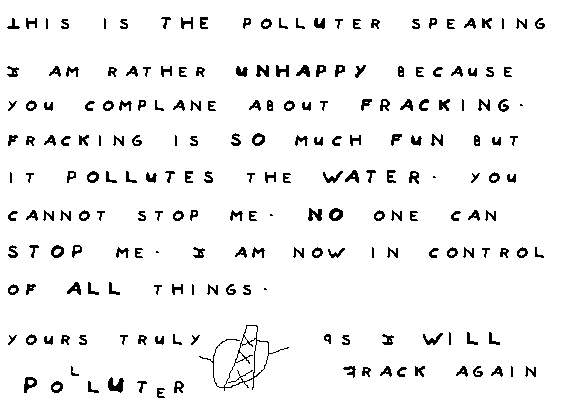The warning:
“Range would drill and complete the wells the same way if we had it to do over again,” Pitzarella said. Source
The background:
In December of 2010, the EPA issued an Imminent and Substantial Endangerment Order because two landowners in Parker County had explosive levels of methane in their water wells and in their homes, plus they had drilling toxins in the water. EPA’s investigation caused them to believe that Range had “caused or contributed” to the contamination. They also believed that the responsibility—burden of proof—for determining the pathway of the contamination should fall on Range Resources rather than the taxpayer. I have blogged about this case extensively.
On December 1, 2011, I attended a hearing in Weatherford, Texas where Range Resources was petitioning the court for a plea to jurisdiction. In my opinion, this is Range’s last ditch effort to weasel out of responsibility for the fracking contamination they caused. Sitting in the courtroom listening, it was obvious to everyone, including the judge, how the water wells became contaminated. You can read my blog post, Decision in Range Resources case would make Big Gas Mafia untouchable in Texas, which describes what I witnessed at the hearing.
What Range Resources knew about the geology in Parker County:
The attorney for Range Resources, […], elaborated in great detail about how “abundantly clear” it is that the area has “angular and nonconforming and unpredictable geology” with many natural pathways for gas to migrate. Source
He also elaborated, at length, that the area is known for the shallow gas in the formations above the Barnett Shale. Range Resources maintains that the Butler and Teal wells they drilled into the Barnett Shale did not cause the contamination in the water wells. They claim the contamination is from shallow gas in the area.
What a petroleum engineer knows about the geology in Parker County:
In the first unbiased reporting from, Jack Smith, about this case, he quotes Thomas Richter, a senior petroleum engineer with PGH Petroleum and Environmental Engineers in Austin:
In his affidavit, Richter said the wellbores of Range's two gas wells penetrate through the Strawn, Atoka, Bend, Conglomerate and Marble Falls formations. Each of these “has been or is currently producing natural gas,” Richter said. There have been 117 gas wells completed or recompleted in those formations within five miles of Range's wells, he said.
What Range should have done considering the considerable knowledge about the geology in Parker County:
Richter goes on in his affidavit to explain how the cementing of the two wells is inadequate to protect drinking water from migrating gas.
Richter also says Range violated an important Railroad Commission regulation, Statewide Rule 13, by not adequately casing and cementing the Teal and Butler wells to ensure that they were isolated from gas-producing formations above the Barnett.
What Statewide Rule 13 says:
(a) General
(1) … all usable-quality water zones be isolated and sealed off to effectively prevent contamination or harm, and all potentially productive zones be isolated and sealed off to prevent vertical migration of fluids or gases behind the casing.
Although Range Resources claims their cementing job complies with TRC Statewide Rule 13’s requirements for cementing below potable water, it does not appear to comply with the cementing requirements of (1) above.
It is “abundantly clear” that Range Resources knew they were drilling in an area with “angular and nonconforming and unpredictable geology” and an area known to produce shallow gas from the “Strawn, Atoka, Bend, Conglomerate and Marble Falls formations,” yet they cut corners and failed to protect the aquifer as required by Statewide Rule 13 from “all potentially productive zones.”
What Range Resources vows to do in the future:
And Matt Pitzarella, Director of Corporate Communications and Public Affairs has vowed they will strike again:
“Range would drill and complete the wells the same way if we had it to do over again,” Pitzarella said.
The Texas Railroad Commission is an industry lapdog that has enabled these serial polluters and they are now untouchable.



